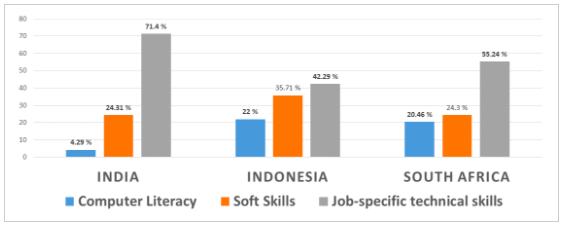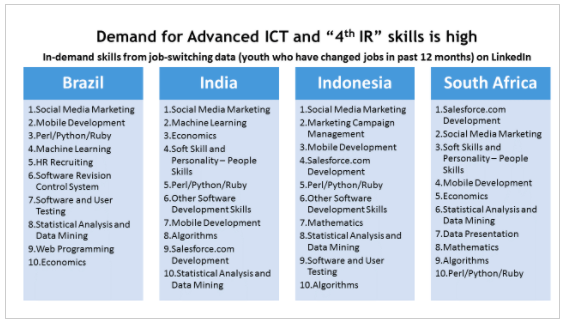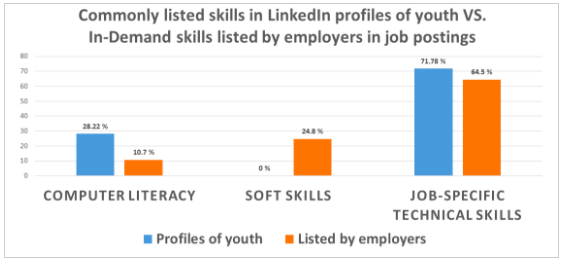The Solutions for Youth Employment (S4YE) Coalition embarked on a research collaboration with LinkedIn to analyze demand and supply side data from 390,000 entry-level job postings and 6.4 million LinkedIn profiles of young people (aged 21-29) in four diverse middle-income countries.
Using big data analytics, the recently released report Skills Gap or Signaling Gap: Insights from LinkedIn in emerging markets of Brazil, India, Indonesia, and South Africa brings the following three insights on what skills employers in those countries are looking for in youth hires.
Employers want it all – a right mix of hard, soft, and computer skills
Employers are looking for well-rounded entry-level candidates who have a combination of technical, soft, and computer skills. This means that companies want it all: the hard skills (the technical knowledge specific to the position), the so-called “soft skills” (such as teamwork, communications, and time management), and computer literacy skills (such as Microsoft Office, email). Our analysis of entry-level job postings on LinkedIn in the four countries suggests that while employers want a mix of skills, they emphasize the technical, or Information and Communications Technology (ICT), skills that are required for the job. Job-specific technical skills make up 65% of the most frequently-listed skills in job postings on the platform in India, Indonesia, and South Africa (% share among the top 20 skills in job postings). This is consistent with recent findings from the World Bank’s Skills Toward Employment and Productivity (STEP) employer surveys in six middle-income and low-income countries, showing that employers place the greatest value on job-specific skills of their workers.

The skills that employers want most
It is not surprising that ICT skills are first on employers’ wishlists. Advanced ICT skills are in high demand in Brazil, India, Indonesia, and South Africa, as technology is a fast-growth sector in emerging markets. Skills such as programming (C++, Java, HTML, SQL, Perl/Python/Ruby), mobile development, software development, social media, and Salesforce feature prominently in entry-level job postings, as well as in the profiles of young LinkedIn members who switch jobs most frequently. Our findings illustrate that youth skilled in statistical analysis and data mining, data presentation, algorithm, and machine learning switch jobs most frequently, which is correlated with high demand in hiring for these skills sets.
But they aren’t the only skills in demand, either. “Services” skills – like customer service, customer relationship management, sales, English, consulting, and business development – are also high on employers’ lists. This reflects of the broader trend of emerging markets becoming increasingly service-oriented and knowledge-based economies. In Indonesia,services sector work has increased from 34% to 53% of employment from 1990-2015, and in South Africa, services led the way in net job creation for youth from 2008-2015.

Signaling your soft skills is a must
In today’s competitive economy, it is not enough just to possess the right skills: job candidates also need to know how to signal relevant skills to prospective employers. This is especially the case with soft skills, or people skills.
Our analysis of the supply and demand of skills shows that both employers and youth are signaling technical and computer literacy skills in their job postings and their LinkedIn member profiles. However, there is a skills signaling mismatch when it comes to soft skills. While soft skills represent 25% of the top 20 skills in job vacancies posted by employers, they do not appear among any of the top 10 skills in young people’s’ profiles across the four countries.

Quoted in part from https://blogs.worldbank.org/jobs/what-linkedin-data-can-tell-us-about-tackling-youth-unemployment



